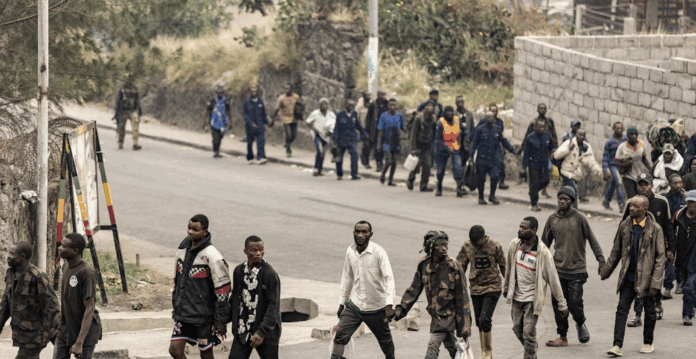On July 19, 2025, a declaration signed in Doha between the Democratic Republic of Congo and the RDF/M23 movement was hailed by the usual diplomatic chorus as a major step toward peace. But beyond the ceremonial language and international handshakes, the true objective lies elsewhere: restoring the effective sovereignty of the Congolese State over its national territory, without ambiguity, without compromise.
The Sovereignty of the Congolese State Is the Cornerstone of the Doha Agreement
The phrase sovereignty of the Congolese State is not a slogan. It is the crux of the matter. Any analysis that avoids this reality, preferring instead to fixate on procedural details or geopolitical choreography, misses the fundamental issue: in the absence of a functioning, respected, and authoritative state, no peace is sustainable.
From Mogadishu to Beirut, and Bogotá to Bangui, recent history provides ample evidence: wherever the state collapses, violence fills the void. The 2013 Addis Ababa agreement failed precisely because it did not reestablish state sovereignty; it merely froze hostilities. The result: the M23 returned in 2022, more entrenched than ever. Doha tries to correct that mistake, but whether it succeeds remains uncertain.
What the Doha Declaration Actually Includes
The “Declaration of Principles” signed in Doha is structured around three pillars:
- A permanent ceasefire, to be implemented before any deployment of public administration.
- An international verification mechanism, involving MONUSCO, the African Union, and the increasingly assertive State of Qatar—whose growing influence in African affairs continues to receive little critical scrutiny.
- A clear roadmap to redeploy the Congolese armed forces (FARDC) and reestablish basic services, administrative, judicial, health, and educational—across the territories formerly controlled by M23.
Yet the text is careful. It avoids stating plainly whether the State’s return will be total and non-negotiable, or if we are heading, once again, toward a form of shared authority with rebel commanders recycled as “local stakeholders.” This ambiguity, left unaddressed, could be fatal.
Rebuilding or Replacing the State in M23-Controlled Zones?
The regions held by M23 have been subjected to atrocities, forced displacements (over 500,000 since January 2025), and a systematic looting of resources. This is not a temporary vacuum; it is the collapse of the Congolese nation in those territories.
Reclaiming the sovereignty of the Congolese State is not a matter of redeploying some troops or appointing new governors. It is about rebuilding the very presence of the State, from local courts and police stations to schools, hospitals, and post offices. And doing so not symbolically, but visibly, tangibly.
Otherwise, we will see the same outcome as in Colombia’s FARC deal: partial demobilization, followed by fragmentation and the rise of dissident militias. The lesson remains: peace cannot be sustained where the State is absent.
Execution, Not Paper: The Crucial Test Now Facing Kinshasa
The Congolese government has said it plainly: peace is not made in conference halls but in the field. The success of the Doha framework depends on several non-negotiable conditions:
- The complete and verifiable withdrawal of M23, without exceptions or loopholes.
- The immediate and functional deployment of civil and military authorities.
- The establishment of credible monitoring and enforcement mechanisms, including sanctions for violations.
But who will guarantee this process? More importantly: is there genuine political will, in Kinshasa and among international partners, to assert full sovereignty, or will the temptation of appeasement prevail once again?
That is the real test. Not the ceremony in Doha, but the months that follow.
Congolese Sovereignty Must Be Imposed, Not Negotiated
The Doha Declaration is a starting point, not a conclusion. Its value will be measured by one criterion alone: whether it results in the unquestioned restoration of the sovereignty of the Congolese State across its entire territory.
Anything less, any compromise with armed groups or vague “integration” formulas, will signal weakness, not peace. And the price will be paid not in diplomatic communiqués, but in the blood of civilians abandoned once again to lawlessness.
This is not about pacification. It is about restoration, through authority, through presence, and through force where necessary.



